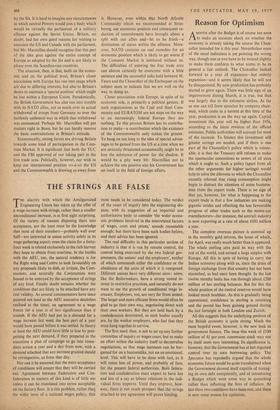Reason for Optimism
A MONTH after the Budget is of course too soon /A to make an accurate check on whether the economy is already taking the course the Chan- cellor intended for it this year. Nevertheless none of the usual indicators is yet pointing the wrong way, though one or two have to be twisted slightly to make them conform to what seems to be in general a fair outlook. The Chancellor looked forward to a year of expansion—but orderly expansion—and it seems likely that he will not be disappointed. By now production has probably started to grow again. There was little sign of an improvement during March, it is true, but that was largely due to the extensive strikes. As far as one can tell from speeches by company chair- men, which come in a torrent at this time of the year, production is on the way up again. Capital investment this year will be higher than 1956, according to the latest revision of the official estimates. Public authorities will account for most of the increase. To finance this investment still greater savings are needed, and if there is one part of the Chancellor's policy which is vulner- able, it is that the Treasury still refuses to make the spectacular concessions to savers of all sizes which it ought to. Such a policy (apart from all the other arguments for higher savings) would help to solve the dilemma to which the Chancellor recently referred that rising consumption might begin to distract the attention of some business- men from the export trade. There is no sign of that yet, however, for what is happening in the export trade is that a few industries are making. gigantic strides and offsetting the less favourable progress of other trades such as the motor-car manufacturers—for instance, the aircraft industry is now exporting at a rate of about £100 million a year.
The complete overseas picture is summed up in the monthly gold returns, the latest of which, for April, was really much better than it appeared. The whole sterling area paid its way with the rest of the world, and earned a large surplus with Europe. All this in spite of having to carry the Indian economy along with us, since the drain of foreign exchange from that country has not been staunched, as had once been thought. In the last twelve months India has run through about £200 million of her sterling balances. But for this the whole position of the central reserves would have looked much healthier. As this is gradually being appreciated, confidence in sterling is returning and the pound has been gaining ground during the last fortnight in both London and Zurich.
All this suggests that the underlying position of the British economy is quite strong. Much the most hopeful event, however, is the new look in government finance. The issue this week of £100 million of 4f per cent. conversion stock may not by itself seem very interesting. Its significance is, however, that the Government has at last regained control over its own borrowing policy. The Spectator has repeatedly argued that the whole economic future would be quite transformed when the Government showed itself capable of manag- ing its own debt competently, and of introducing a Budget which went some way to quenching rather than inflaming the fires of inflation. At last these two conditions have been met, and there is now some reason for optimism.


































 Previous page
Previous page